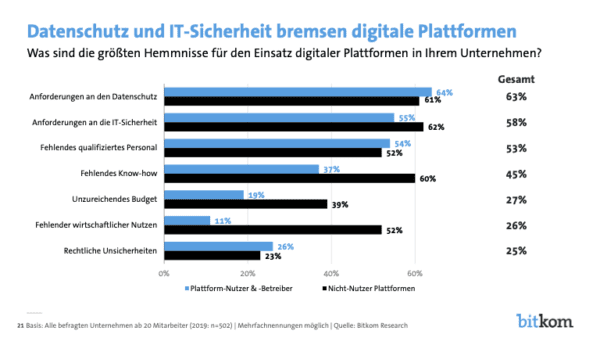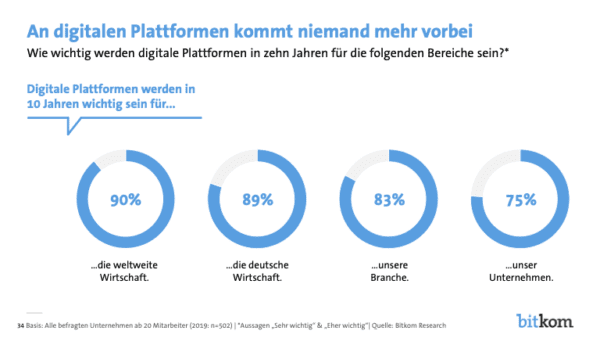Streaming videos, shopping online or sending funny videos to friends – digital platforms are a natural part of our everyday lives. But there is much more behind these platforms: They embody the marketplaces of today and offer space for a variety of different business models. Digital platforms form the basis for social media providers, search engines, comparison and rating portals, and even online gaming. All these platforms pursue the same goal: they bring together providers and interested parties, or potential customers, in the digital marketplace and promote innovation and exchange. In short, supply and demand effectively meet. Digital platforms create new connections of customer groups, attractive markets, competitive advantages through better market development, and new sources of revenue. The platform economy creates added value and is an important building block for the convergence of industries.
Potential lies in growing market power
Digital platforms are often associated exclusively with social networks, including YouTube, Facebook or Instagram. However, the potential applications of digital platforms go much further. Consumer groups, companies and even government institutions are united there. Consequently, different platform segments established themselves. From business-to-business (B2B) to business-to-customer (B2C) to business-to-government (B2G) platforms, everything can be found on the World-Wide-Web today. Due to the increasingly steep growth figures, a wide variety of manufacturers and retailers are jumping on the platform economy bandwagon – and with good cause: Internet-based platforms take over important functions in business life and everyday life and offer enormous growth opportunities as a digital business model. The potential of digital platforms can be exploited either by setting up one’s own online platform or by simply using an already existing platform, e.g., as a sales channel. In 2020, 6 out of 10 companies in Germany were already using digital platforms or had already set one up by themselves.
Perceived risks of digital platforms
Despite the manifold advantages and opportunities, the platform economy also entails risks. A study on the importance of digital platforms for companies in Germany in 2020 found that some companies are still very reluctant to use digital platforms due to data protection and IT security requirements and a lack of qualified personnel.

There is also a perceived risk of excessive competition among platform users and operators as well as non-users. Due to the ease of market entry, competition among digital platform providers is increasing. Another risk factor is increased price pressure: In order to stand out from the competition, it is essential to offer attractive prices that are as favorable as possible compared with the competition.

The displayed statistics clearly show that it is predominantly non-users who still perceive many risks and disadvantages in the area of digital platforms.
“The winner takes it all”: One winner – many losers?
As already mentioned, the intensity of competition between digital platforms is enormous. Thus, it is not uncommon that in certain markets there can be a strong market concentration up to a monopoly position. This is also referred to as “the winner takes it all” markets. If one platform alone dominates a market, there is no longer any fair competition. Basically, 3 factors are responsible for the centralization of platform markets:
- The network effects characteristic of platforms: Platforms that already have many customers attract more and more new users due to their broad customer base. The value and also the attractiveness of a product or service therefore depends on how many other users also perceive the offer. Consequently, this platform dominates the market and can, for example, increase prices or turn previously free functions into paid ones.
- The scale effect: It describes the reduction in production costs due to a company’s economy of scale, which is reflected in falling unit costs of products or services. In terms of digital platforms, it is about collecting and analyzing data. Basically, providers who have a lot of data at their disposal have a decisive competitive advantage.
- Is the effort of a platform change worth it? – The lock-in effect: The time or financial effort required to switch from one platform to another is often perceived as an obstacle. For this reason, many users avoid switching.
These effects have an impact on the centralization of the market and have a negative impact on the intensity of competition. For small and medium-sized enterprises (SMEs), this makes it increasingly difficult to assert themselves in the market.
The basic rule in the world of platforms is: Grow so fast and strong that no one can compete against you, because size is the most important competitive advantage there.
Big Data as a valuable resource in the platform economy
Data collection and analysis is an essential part of the value chain of platforms. In the process, an almost unlimited amount of data is collected and further processed and made available with the help of algorithms. The more information that emerges from data analysis, the easier it is to determine the interests of the target group and thus develop a suitable advertising strategy. Accordingly, the extensive use of data enables continuous optimization and increased efficiency in product design, manufacturing, sales, marketing and other important areas of the value chain. Data – if it can be stored and meaningfully processed – therefore has an economic value. While individual data records do not yet represent a usable value, large data volumes, so-called Big Data, are becoming a resource. The need to provide usable data has not been a secret for a long time. For this reason, some service offerings are seemingly offered free of charge. In return, the user provides free access to his data. Accordingly, the competition of digital platforms in the product space is becoming less and less important and is increasingly focused on the data space. Consequently, the architecture of platforms is evolving into a data economy infrastructure.
A look into the future of the platform economy
Currently, one can speak of an evolution of the platform economy: Existing platforms continue to develop and attract more and more users, others are being pushed out of the market, and new platforms are being established. Looking to the future, it is still possible and advisable for a company to enter the platform economy. However, it is important to always keep an eye on technological developments, as change is the only constant in the digital world market. Furthermore, 53% of the companies in the aforementioned study state that there should be uniform rules for digital platforms throughout Europe in order to promote their use. In addition, half of the companies would like to see increased legal certainty. Likewise, public funding and support for cooperations with other companies to build digital platforms are perceived as important.
In 2030, it will hardly be possible to do without digital platforms. These will be indispensable mainly in the business sector. However, companies should also act with an eye to the future – if they have not already done so – and jump on the platform economy bandwagon.

We at magility always keep an eye on the latest developments in the platform economy and keep you up to date. If you have any questions, feel free to contact us!
To make sure you don’t miss any news, be sure to follow us on LinkedIn.



